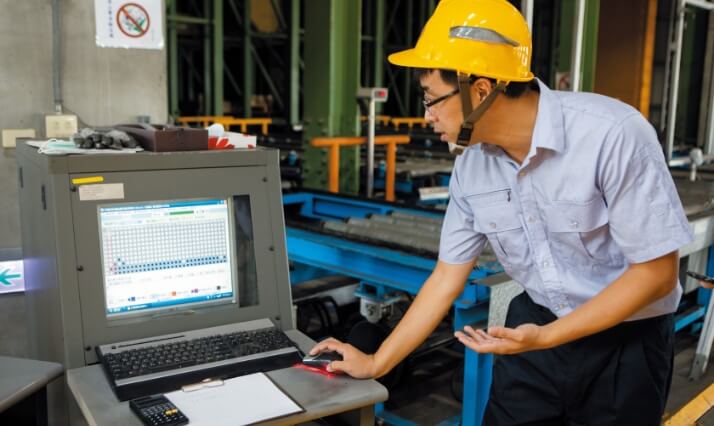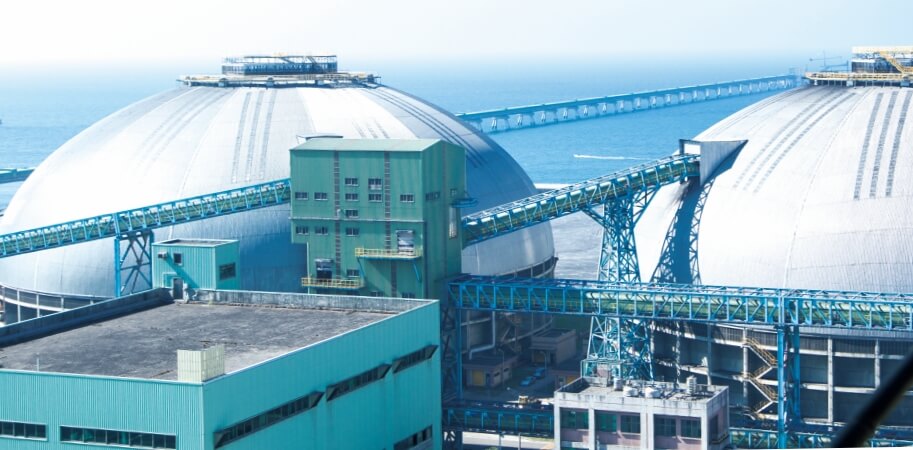Supplier Composition
Taipower's suppliers include the providers of fuel, materials, and equipment necessary for power generation and as well as suppliers of external electric power. The Company monitors the potential risks of suppliers with different characteristics and manages their quality, output, and impact on the environment and society.


Fuel Supplier Management
The main fuels used in Taipower's thermal power plants are coal, natural gas, and fuel oil. Nuclear power plants also require nuclear fuel. Taipower adheres to the four strategies of energy supply diversification, long-term supply contracts, safe inventories, and stable coal transportation to ensure stable fuel supplies. The Company provides power plants with fuel promptly and at suitable quality and quantity to ensure the safety and stability of the power supply. Detailed measures and actions are described below:
Suppliers of Materials and Equipment
The Materials Supply Chain
Taipower oversees the entire materials supply chain-from material coding, supplier qualification,and approved vendor management to requisition, procurement, acceptance,and logistics. Internal training and consultation on the Government Procurement Act are provided to ensure compliance. The Company is also advancing a digital transformation of the supply chain through the implementation of Enterprise Resource Planning (ERP), Supply Chain Management (SCM), Smart Procurement Assistant System (SPAS),Warehouse Management System (WMS), and Material Traceability Management System (MTMS),thereby strengthening internal and external collaboration and building a comprehensive management framework.
Equipment Supply Chain
To ensure supplier-provided equipment meets Quality, Cost, Delivery, and Service (QCDS) requirements,Taipower has adopted ISO 9001 to integrate evaluation,re-evaluation, interim inspection, and defect feedback.Relevant regulations were revised to establish a quality assurance program for power equipment,enhancing suppliers' capabilities to deliver compliant products.
Electricity Suppliers
As of the end of 2024, Taipower had signed power purchase agreements with 11 IPPs, 49 cogeneration providers, and 66,480 renewable energy installations (including solar, wind, hydro, and others).Total power purchased from external sources in 2024 reached 79 billion kWh.
Creating a Sustainable Supply Chain
Supply Chain Management Mechanisms
To ensure material quality, power supply safety, and procurement efficiency,all of Taipower’s procurement activities follow the Government Procurement Act. The Instructions to Tenderers and Contract Terms incorporate requirements on human rights, environmental protection, labor safety, labor rights, anti-human trafficking, and protections for people with disabilities and indigenous peoples. Taipower promotes sustainable supply chains through communication and cooperation, and in agreement-based commitments with suppliers. To enhance supply chain resilience, Taipower continues sourcing equipment domestically and has established a Supply Chain Management (SCM) platform and promoted digital supply chain collaboration (including supply chain financing). Since 2023,Taipower has introduced ESG reviews into its supplier management system. These reviews assess resilience from the perspectives of sustainable operations, environmental friendliness, and social responsibility, and aim to mitigate risks and support long-term corporate sustainability.
Supplier ESG Review
Stability, resilience, and sustainability have become new expectations for Taipower's supply chain management. On top of the existing (Quality, Cost, Delivery and Service (QCDS)framework, Taipower has introduced an additional "S" for Sustainability. The Company has also established a Code of Conduct for Material Suppliers, covering compliance with environmental, occupational safety and health, and labor and human rights standards. Suppliers are also required to sign a Sustainability Commitment Letter. Taipower is strengthening both internal and external sustainability capabilities, identifying ESG risk issues across the supply chain, assessing key actions and implementation progress, enhancing ESG management capacity, and working with suppliers to build a sustainable supply chain. These efforts encourage suppliers to reduce carbon emissions, minimize waste, improve labor conditions, and reinforce supply chain resilience and adaptability-paving the way for the gradual rollout of a sustainability review mechanism aligned with the QCDSS framework.

Establishing a Cloud-Based Supply Chain Collaboration Platform Integrating Procurement, Contract Management, and Material Operations

Material Supply Chain Sustainability Assessment Action
To strengthen the ESG management of company-level material suppliers, Taipower referred to the principles of ISO 20400 Sustainable Procurement – Guidance to identify key sustainability issues. Based on these issues, corresponding management requirements were proposed for suppliers.
| Issue \ Category | Transformers and Inverters | Electronic Control Equipment and Materials | Metal Instruments | Cables | Telecommunications and Communications Equipment |
| Corporate Governance | ● | ● | |||
| Labor Standards | ● | ● | ● | ||
| Environmental Issues (including climate change) | ● | ● | ● | ||
| Fair Operating Practices | ● | ● | |||
| Consumer Rights (including quality control) | ● | ● | ● | ● | |
| Community Engagement and Development | ● |



